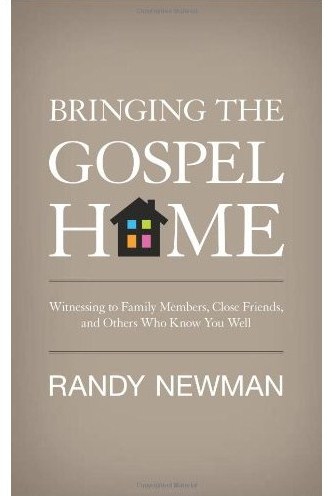Book Review: Bringing the Gospel Home


Bringing the Gospel Home: Witnessing to Family Members, Close Friends, and Others Who Know You Well, Randy Newman, Wheaton: Crossway, 2011. Soft cover, 220 pages, $15.99.
There are growing numbers of first generation Christians in our Reformed churches. There are also growing numbers of those who have come from unbelieving families that a generation or two ago were Christian. These brothers and sisters face the question of what to do about their unbelieving parents, grandparents, siblings, and other relatives. Sadly, we do also have those whose children or grandchildren have abandoned Christianity. There too, we can be confronted with the question of how to most effectively reach out to these loved ones with the gospel. If you identify with any of those situations, then this book is for you.
Randy Newman grew up in a Jewish family and was brought to faith in Christ while in college. He’s writing out of his own first-hand experiences. He’s also interviewed numerous others with a burden for lost loved ones. They and he have learned that evangelizing family is tough.
This is a well-written and practical guide to evangelism amongst those who know us best – and may be the least likely to listen to our witness. Each chapter is structured around a biblical theme: Family, Grace, Truth, Love, Humility, Time, and Eternity. At the conclusion of each is a set of concrete “Steps to Take.” The book is filled with anecdotes – many with happy endings, and some not so happy. As I was reading the book, I often got the sense that the author was sitting across from me and telling me all this first-hand. Bringing the Gospel Home has a breezy, conversational feel to it and the author’s great sense of humour is often evident.
Let me just one paragraph to give you a feel for the book. It comes from the chapter on humility. Newman suggests that humility can sometimes be framed as a question. Sometimes it can be put as a request for permission:
“Would you ever be up for discussing spiritual things?” sounds less threatening to some people than, “If you were to die tonight, how sure are you that you’d go to heaven?” A permission question accomplishes two things. It disarms the hearer of normal resistance because the question implies you don’t want to talk about religion right now. It also opens the person up to your presentation at some later date because they gave you permission. The contrast yields dramatically differing results. (143-144)
That’s a fabulous suggestion and it could be useful in many other situations besides witnessing to family.
Bringing the Gospel Home is theologically sound and saturated with a passion for teaching people the best ways to share the good news of Christ. It has the potential to be a powerful tool to help those who care about the eternal destiny of unbelieving loved ones. This is definitely among the best books on evangelism that I’ve come across.


